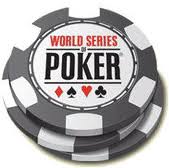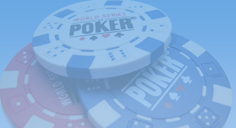Rules of 5 Card Stud
 5 Card Stud poker first appeared during the
American civil war and was the first of all Stud games to rear it's head. Back then, it was the game of choice. It's only in the last 20 years that it has been surpassed by card room favorites such as Texas Hold'em and Omaha Poker. Given this was the top dog for such a long period of time, it was no surprise to see it's inclusion in the 1971 World Series of Poker, where it stayed until it's final year in 1974 (all four events were won by poker legend Bill Boyd).
5 Card Stud poker first appeared during the
American civil war and was the first of all Stud games to rear it's head. Back then, it was the game of choice. It's only in the last 20 years that it has been surpassed by card room favorites such as Texas Hold'em and Omaha Poker. Given this was the top dog for such a long period of time, it was no surprise to see it's inclusion in the 1971 World Series of Poker, where it stayed until it's final year in 1974 (all four events were won by poker legend Bill Boyd).
The question as to why it was dethroned is a common one amongst enthusiasts of the game. There's no definitive answer however it's likely for the simple reason as it's not as exciting as some of it's more popular peers. Not as exciting, perhaps, but still makes for a good game! Anyway, we'll look at the reasons in more depth later in this guide. Firstly, it differs from most modern Stud variants, simply due to the number of visible cards (as many don't have any), which makes it easier for players to judge the strength of their hands (another reason perhaps why it's not as popular). With four rounds of betting, judging 'when to hold 'em and 'when to fold 'em' is critical, as they are in any game (but less so in games with fewer betting rounds). The four betting rounds simply translates into more expense when you get it wrong. As with most games, patience and skill are key to success.
The Deal
In common with a large number of other games, the dealer will deal to the player immediately left of the dealer button, and then to each player, clockwise round the table. In 5 Stud, all players will be dealt two hole cards, one face down and one face up (known as the door card). There is now a round of betting with the action starting with the player with the lowest card and suit (known as the "force" or "bring-in" bet), This is a forced bet and would be half of the low limit (so if playing $5-$10 would be $2.50). It's not common for games to use the ranking by suit in play, so it's unique in that regard. The suits are ranked in alphabetical order, so Spades, Harts, Diamonds, Clubs with Spades being the top suit (with Clubs the lowest). After this initial deal and betting round, the suits do not play a further part in determining the strength of a players hand.
The Third Card Dealt (Third Street)
This is the third card to be dealt to each player. The dealer will first deal to the player on the immediate left of the dealer, again dealing clockwise round the table. This card is dealt face up (you will now have two up and one down) and the dealer should always burn a card to the muck before this card is dealt. There is then a a further round of betting and as with the first betting round, starts with the player with the highest two card value. This player is said to 'have the action'). There will be occasions where two or more players have the same hand. The player closest to the dealers left will be the first to play.
The player who 'has the action' after this card is dealt can check to the next player clockwise or make a bet. All bets at this stage are lower limit.
The Fourth Card Dealt (Fourth Street)
The fourth card dealt to players is also dealt face up (you'll now have three cards up and one down) and again, the highest hand will start the next round of betting'. This is the first stage where bets are now at the 'higher limit'.
The Fifth Card Dealt (Fifth Street)
This is the final hole card dealt to players and will now complete their hand. All players still in the hand (.i.e. who haven't folded) will have one card face down and four cards face up. There is now one final round of betting followed by showdown, in which players will turn over their face down card to reveal their five card poker hand with best hand winning the pot. The last aggressor to the pot should show cards first.
Just to recap, here is the order of play and betting structure:
All players ante
![]()
Each player is dealt one card face-down (hole card)
and one card face-up (door card)
![]()
First betting round
![]()
Each player is dealt one card face-up
![]()
Second betting round
![]()
Each player is dealt another card face-up (4th
street)
![]()
Third betting round
![]()
Each player is dealt a last card face-up (river)
![]()
Final betting round
![]()
Showdown
Why has 5 Card Stud has not reached the popularity of other Stud variations or Texas Hold'em?
We covered a few reasons earlier in this guide. Another possible reason is that players receive only five cards and as such, the hand values vary dramatically from games like 7-card stud or Hold'em, where players choose the best five from the seven that are available. It is far easier to make a strong hand when you can pick five out of seven cards, rather than just getting five.
One major problem with 5-card stud, and another possible reason for the lack of popularity is that there is too much information available to the players on the table. You don't have this to the same extent in Holdem or Omaha. With only one hidden card, it is very easy to see what an opponent's best possible hand might be and bluffing becomes far more difficult, reducing the 'fun factor' and appeal the game would need. Further, unless the ante is very high, there is little reason to try to chase down an opponent from behind as there's invariably less money on the table (again not good for popularity).
General 5 Card Stud Poker Strategy
In terms of strategy, the game is predominantly a game or pairs and high cards. It's sensible not to play for straights and flushes unless you have three cards to a straight flush on third street. Similarly, it's not wise to play for a flush or straight unless you think you might hit a straight or flush on fourth street. It is advisable to stay out of the hand unless you have a pair or at least one live card that beats the board. It's sensible to fold when you are beaten on the board and do not have a good draw to the perceived best hand.
Playable 5 Card Stud Hands
Play Any Pair - Fast play low pairs to try to get heads up. Consider folding if you don't get trips or a live up card on third street. Bet/Call high pairs.
Play when you have both cards HIGHER than the board - For example you hold 6 - 8 and there is no opponent up card that is higher than 5
Play the hand when you have a high hole card that beats the board with any high card - For example you have J down - 8 up and there is no opponent up card that is higher than ten.
HIGH UPCARD that BEATS the BOARD with HIGH CARD in the HOLE - An Ace up is a good hand that you can sometimes take past third street unpaired, if you have a good kicker. The high card in the hole does not have to beat the board.



Popular Top-Lists
Recommended Visit
Popular Pages













 Top UK Poker Options
Top UK Poker Options